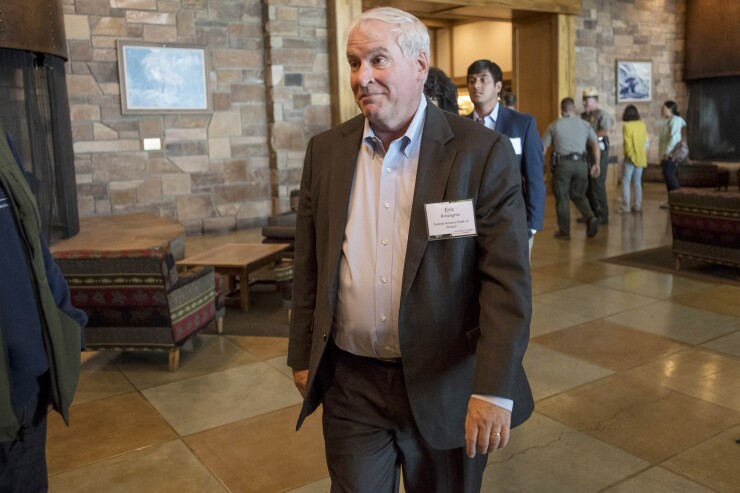Two Federal Reserve Bank presidents were positive about the economy in 2020, but offered a look at what worries them.
A surge in inflation and an asset bubble are the risks most worrying Federal Reserve Bank of Boston President Eric Rosengren, he said Monday, while Federal Reserve Bank of Atlanta President Raphael Bostic said he’s most concerned about the “persistence of uncertainty.”
While forecasters and Federal Open Market Committee members expect “a good outcome for the economy in 2020 and beyond, with low inflation and strong labor markets,” Rosengren said he will focus on “two potential risks,” according to prepared text of his remarks, released by the Fed.

“However, as with any forecast, there are risk scenarios that are not captured in the most likely outcome for the economy,” he added. If the economy grows faster than projected because of easy monetary policy, he said the two risks that concern him are: “inflation picking up more than currently expected; and asset prices, particularly real estate prices, showing evidence of more acute financial stability risks.”
While there are downside risks to the outlook, mostly from trade issues, Rosengren said, “I see the potential risks to inflation and financial stability as somewhat more concerning, overall.”
Inflation could accelerate if labor markets “tighten to unsustainable levels,” while low rates could spur “consumers and firms to take on riskier financial investments in search of better returns, increasing asset prices to unsustainable levels.”
He cited the real estate market as a potential for bubbles. “Some of the more severe recessions, both in the U.S. and abroad, have occurred when real estate prices collapsed and the financial positions of highly leveraged institutions and households became precarious,” Rosengren said. “That is, the debt they held came to greatly exceed the value of the assets they had borrowed against.”
With low rates and low unemployment, the economy is in an area “central bankers do not have much historical experience with,” he added, “So we want to be alert to any potential risks emerging.”
Bostic, speaking on livestream from the Rotary Club of Atlanta, said, “The economy’s doing fine,” performing at a level above the baseline expectations, with no recession in sight. “There’s not a lot that we have to do to stimulate” or slow the economy.
“We should sit back and let the economy do what it’s doing” until the next hiccup forces the Fed to adjust policy, he said. "It's going to be a pretty high bar for us to make policy more contractionary."

When asked what he would consider an event that would cause the Fed to make a “material reassessment” of its outlook, Bostic suggested if businesses start “approaching their business differently” or if consumers stop spending.
Bostic said using negative interest rates would make him "a little uncomfortable" because with no experience with such rates, it's hard to predict what will happen.
Employment trends index
The Conference Board’s employment trends index (ETI) slipped to 109.68 in December, from 110.51 in November, and has fallen 1.2% in the past 12 months.
The index “continues to be on a flat trend since the summer of 2018,” said Gad Levanon, head of the Conference Board Labor Markets Institute. “In the current state of the labor market, a flat index is consistent with an ongoing labor market expansion. We expect job growth to remain solid and the labor market to continue tightening.”
Survey of consumer expectations
The Federal Reserve Bank of New York’s survey of consumer expectations found inflation expectations were mixed as the one-year rate of inflation was seen growing 2.5% in the December survey, up from 2.4% a month earlier, while the three-year held at 2.5%.
“Expectations for three-year ahead inflation, home price changes, earnings growth, unemployment, and income growth remained unchanged in December,” according to the survey. “Consumers were also slightly more pessimistic about other labor market outcomes, such as the perceived probability of losing one’s job or the perceived probability of finding a new job.”





